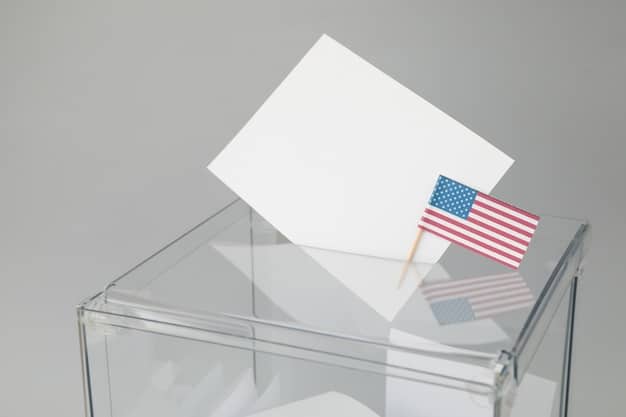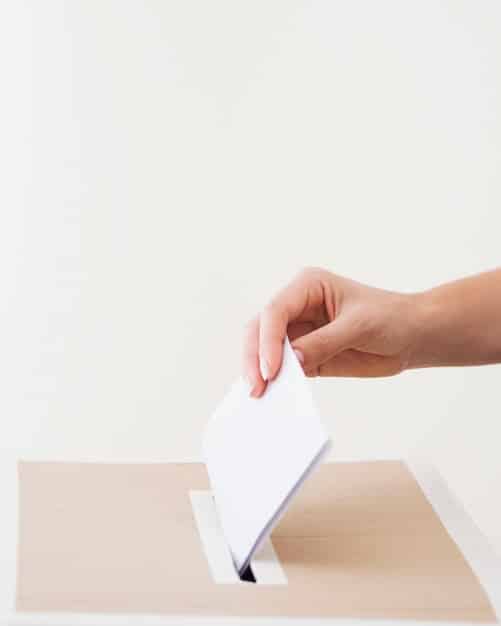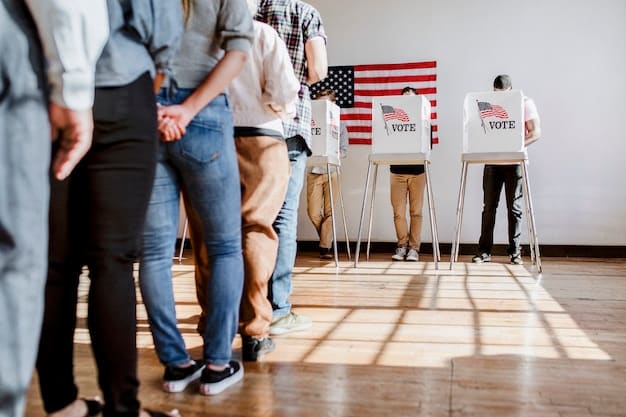Republican Party & Election Integrity: Solutions for 2025

The Republican Party is addressing concerns about election integrity in the US through various proposed solutions for 2025, including voter ID laws, enhanced auditing processes, and restrictions on mail-in voting, aiming to restore public confidence in the electoral system.
The integrity of US elections has become a focal point of political debate, particularly within the Republican Party. As the 2025 elections approach, understanding how the Republican Party is addressing concerns about election integrity in the US, and what are the proposed solutions for 2025 is crucial. This article delves into the specific measures being considered and debated to ensure fair and secure elections.
Republican Party’s Focus on Election Integrity
For many Republicans, ensuring election integrity is a top priority. Concerns about voter fraud, accuracy of voting machines, and transparency in ballot counting have driven the party to propose and advocate for various reforms. Understanding the root causes of these concerns is vital.
Historical Context of Election Integrity Concerns
The emphasis on election integrity within the Republican Party has grown significantly in recent years. Tracing back to key moments and events, it’s evident how specific elections and legal challenges have shaped the party’s stance.
- 2000 Presidential Election: The contested outcome in Florida highlighted vulnerabilities in the electoral process.
- 2020 Presidential Election: Allegations of widespread fraud, although largely unsubstantiated, fueled further scrutiny and demands for reform.
- Legal Challenges: Various court cases and audits have either validated or debunked claims, contributing to ongoing debates.
Key Figures Driving the Election Integrity Push
Several prominent figures within the Republican Party have been instrumental in advocating for election integrity measures. Understanding their roles and influence can provide insight into the party’s direction.
- State Legislators: Many state-level Republicans have introduced and passed legislation aimed at tightening election laws.
- Conservative Think Tanks: These organizations provide research and policy recommendations to support election integrity efforts.
- Grassroots Movements: Citizen-led groups have organized to advocate for audits, voter ID laws, and other reforms.
In conclusion, the Republican Party’s focus on election integrity is deeply rooted in specific historical events and driven by influential figures within the party. Understanding this context provides a foundation for examining the specific solutions being proposed and debated.

Proposed Solutions: Voter ID Laws
One of the most widely debated solutions proposed by the Republican Party is the implementation of stricter voter ID laws. These laws require voters to present identification before casting their ballot, with the aim of preventing voter impersonation and ensuring that only eligible citizens vote.
Arguments in Favor of Voter ID Laws
Proponents of voter ID laws argue that they are necessary to safeguard against fraud and maintain public confidence in elections. They point to studies and anecdotal evidence suggesting that voter impersonation, while rare, can occur and potentially influence election outcomes.
- Preventing Voter Impersonation: ID laws make it more difficult for individuals to vote under someone else’s name.
- Enhancing Public Confidence: Requiring ID can reassure voters that the system is secure and fair.
- Consistency with Other Requirements: Supporters argue that if ID is required for other activities like cashing checks or boarding planes, it should also be required for voting.
Criticisms and Concerns About Voter ID Laws
Opponents of voter ID laws argue that they disproportionately affect certain demographic groups, such as low-income individuals, minorities, and the elderly, who may have difficulty obtaining or affording the required identification. They also contend that voter impersonation is exceedingly rare and that ID laws are a solution in search of a problem.
- Disproportionate Impact: Studies have shown that ID laws can reduce turnout among minority voters.
- Limited Evidence of Fraud: Critics argue that voter impersonation is not a significant issue.
- Potential for Discrimination: Some argue that ID laws are designed to suppress turnout among certain groups.
Ultimately, voter ID laws remain a contentious issue, with significant debate over their effectiveness, impact, and necessity. Understanding both sides of the argument is crucial for evaluating their potential role in ensuring election integrity.
Enhanced Auditing Processes
Another key component of the Republican Party’s approach to election integrity is the call for enhanced auditing processes. These processes involve scrutinizing election results and procedures to identify discrepancies, errors, or potential fraud. The specific methods and scope of these audits have been subjects of intense debate.
Types of Audits Republicans are Proposing
Republicans have proposed a variety of audit methods, ranging from traditional hand recounts to more sophisticated statistical analyses and forensic examinations. Understanding the nuances of these different approaches is important for assessing their potential impact.
- Hand Recounts: Manually recounting ballots to verify the accuracy of machine counts.
- Statistical Audits: Using statistical methods to identify anomalies and patterns that may indicate fraud or errors.
- Forensic Audits: Involving a comprehensive examination of voting machines, software, and election procedures.
The Controversy Surrounding Audits
While proponents argue that audits are necessary to ensure accuracy and transparency, critics caution against politically motivated audits that can undermine public confidence in elections. The partisan nature of some audits has raised concerns about bias and the potential for disinformation.
There are a number of controversies surrounding audits:
- Partisan audits can undermine public confidence in elections.
- Audits can lead to increased distrust in electoral procedures when not properly conducted.
- The results of audits may be used to cast doubt on legitimate election outcomes.
In conclusion, the implementation of enhanced auditing processes remains a complex and contested issue. Balancing the need for transparency with the potential for political manipulation is a critical challenge. The integrity of the audit process itself is paramount to ensuring that it serves its intended purpose of verifying election results and promoting public confidence.
Restrictions on Mail-In Voting
Mail-in voting became a central issue in the 2020 elections, and Republicans have since proposed various restrictions aimed at limiting its use. Concerns about security, potential for fraud, and administrative challenges have fueled this effort.
Republican Concerns About Mail-In Voting
Republicans have raised several concerns about mail-in voting, arguing that it is more susceptible to fraud, coercion, and errors than in-person voting. These concerns have led to calls for tighter regulations and restrictions on who can vote by mail.
Proposed Restrictions on Mail-In Voting
In response to these concerns, Republicans have proposed a range of restrictions on mail-in voting, including limiting eligibility, requiring stricter ID verification, and reducing the number of drop boxes. These measures aim to reduce the potential for fraud and improve the security of mail-in ballots.
The proposed restrictions include:
- Restrictions on who can vote by mail.
- Tighter ID verification requirements.
- Reducing the number of drop boxes.
Arguments Against Limiting Mail-In Voting
Critics of these restrictions argue that they disenfranchise eligible voters, particularly those with disabilities, elderly individuals, and those who live in rural areas. They also point to studies showing that mail-in voting is generally secure and that fraud is rare.
Opponents point out that:
- Restrictions disenfranchise eligible voters.
- Mail-in voting is generally secure.
- Fraud is rare.
Restrictions on mail-in voting remain a contentious issue. Balancing the goal of ensuring election security with the need to maintain accessibility for all eligible voters is a significant challenge.

Addressing Voting Machine Concerns
Concerns about the security and accuracy of voting machines have also gained traction within the Republican Party. Proposals to address these concerns include upgrading machines, implementing stricter security protocols, and increasing transparency in the certification and auditing processes.
Security Concerns
Vulnerabilities in voting machine software and hardware have raised questions about the potential for hacking and manipulation. Republicans have called for measures to address these vulnerabilities and ensure the integrity of voting machines.
Proposed Solutions
Proposed solutions include upgrading voting machines, implementing stricter security protocols, and increasing transparency in the certification processes. The use of paper ballots and post-election audits is also being considered to verify the accuracy of machine counts.
Transparency in Certification and Auditing
Increasing transparency in the certification and auditing processes can help build public confidence in the accuracy and security of voting machines. Openly sharing information about machine testing, security protocols, and audit results can reassure voters that the system is trustworthy.
Transparency can be achieved by:
- Openly sharing information about machine testing.
- Publishing security protocols.
- Disclosing audit results.
Addressing voting machine concerns is essential for restoring public trust in elections. Implementing robust security measures and increasing transparency can go a long way in reassuring voters that their votes are accurately counted and protected.
The Role of Technology in Election Integrity
Advancements in technology offer both opportunities and challenges for election integrity. While technology can improve efficiency and accessibility, it also creates new avenues for fraud and manipulation. Republicans are exploring various technological solutions to enhance election security.
Blockchain Technology
Blockchain technology offers the potential to create a secure and transparent voting system. By recording votes on a distributed ledger, blockchain can make it more difficult to alter or manipulate election results. However, concerns about scalability, security, and accessibility need to be addressed before blockchain can be widely adopted.
Cybersecurity Measures
Protecting election systems from cyberattacks is crucial for maintaining election integrity. Investing in robust cybersecurity measures, such as intrusion detection systems, firewalls, and employee training, can help prevent hacking and data breaches. Regular security audits and vulnerability assessments are also essential.
Cybersecurity should include:
- Intrusion detection systems
- Firewalls
- Employee training
Data Analytics
Data analytics can be used to identify patterns of voter fraud and irregularities. By analyzing voter registration data, turnout rates, and other relevant information, election officials can detect potential anomalies and investigate suspected cases of fraud. However, concerns about privacy and potential biases in data analysis need to be carefully considered.
Data analysis must consider:
- Privacy
- Potential biases
Technology plays a critical role in modernizing elections and enhancing security. Carefully evaluating the benefits and risks of different technologies is essential for ensuring that they are used to promote election integrity in a responsible and effective manner.
Challenges and Roadblocks
The Republican Party’s efforts to address concerns about election integrity face several challenges and roadblocks. These include legal challenges, political opposition, and public skepticism. Overcoming these challenges will require building consensus and demonstrating the effectiveness and fairness of proposed solutions.
Legal Challenges
Many of the proposed election integrity measures have faced legal challenges from civil rights groups and other organizations. These challenges often allege that the measures are discriminatory or violate the Voting Rights Act. Successfully defending these measures in court requires strong legal arguments and evidence demonstrating their necessity and fairness.
Political Opposition
Democrats and other political opponents have strongly opposed many of the Republican Party’s election integrity proposals. They argue that these proposals are designed to suppress voter turnout and undermine democracy. Building bipartisan support for election reform requires compromise and a willingness to address legitimate concerns from all sides.
Democratic opposition usually maintains that the proposed solutions:
- Suppress voter turn out.
- Undermine democracy.
Public Skepticism
Public skepticism about the fairness and accuracy of elections poses another significant challenge. Overcoming this skepticism requires transparency, education, and a commitment to ensuring that all eligible voters have the opportunity to participate in free and fair elections. Building public trust is essential for maintaining the legitimacy of the democratic process.
To overcome hurdles, it’s necessary to:
- Increase transparency.
- Educate voters.
- Ensure fair elections.
In conclusion, addressing concerns about election integrity is a complex and multifaceted issue. Overcoming the challenges and roadblocks requires a concerted effort from all stakeholders to build consensus, address legitimate concerns, and promote public trust in the electoral process.
| Key Point | Brief Description |
|---|---|
| 🔑 Voter ID Laws | Requiring voters to present identification at polling places. |
| 🗳️ Enhanced Audits | Implementing more rigorous audits and recounts of election results. |
| 🚫 Mail-in Restrictions | Limiting the availability and use of mail-in voting options. |
| 💻 Voting Machine Security | Upgrading and securing voting machines to prevent cyberattacks. |
Frequently Asked Questions
▼
Republicans primarily focus on voter fraud, security of voting machines, and the accuracy of voter rolls. These concerns often lead to proposals for stricter voting laws and audit processes.
▼
Voter ID laws require voters to present identification at the polls, which Republicans argue helps prevent voter impersonation and ensures that only eligible citizens vote.
▼
Republicans propose a range of audits, including hand recounts, statistical audits, and forensic audits of voting machines, to verify election results and identify potential discrepancies.
▼
Republicans express concerns that mail-in voting is more susceptible to fraud, coercion, and errors compared to in-person voting, leading to proposals for stricter regulations.
▼
Blockchain technology, enhanced cybersecurity measures, and data analytics are being explored to improve election security and transparency, though challenges remain with implementation.
Conclusion
Addressing concerns about election integrity remains a complex and evolving issue within the Republican Party. The proposed solutions, ranging from voter ID laws to enhanced auditing processes and technology integration, reflect a commitment to ensuring fair and secure elections. Navigating the legal, political, and technological challenges will be crucial for building consensus and restoring public trust in the democratic process as the 2025 elections approach.





